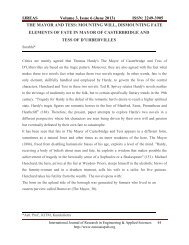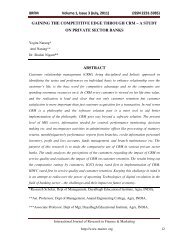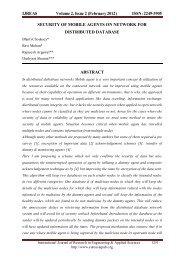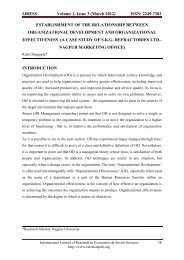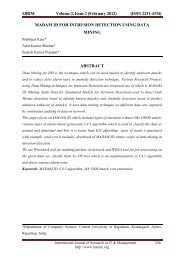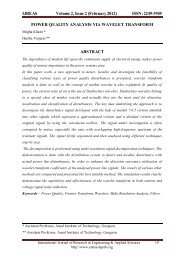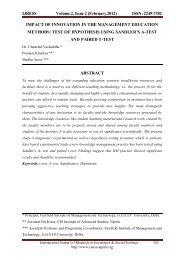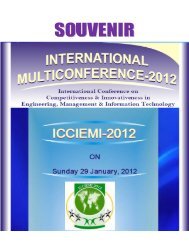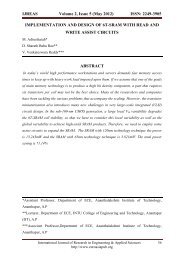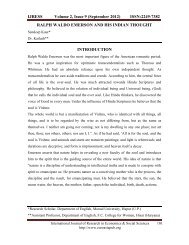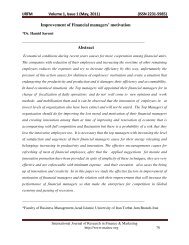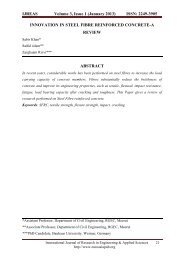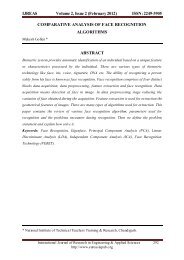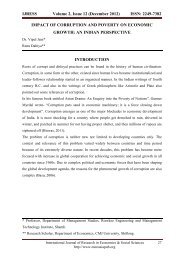THE ROLE OF MASS MEDIA IN CREATING ... - Euroasiapub.org
THE ROLE OF MASS MEDIA IN CREATING ... - Euroasiapub.org
THE ROLE OF MASS MEDIA IN CREATING ... - Euroasiapub.org
- No tags were found...
You also want an ePaper? Increase the reach of your titles
YUMPU automatically turns print PDFs into web optimized ePapers that Google loves.
IJRIM Volume 3, Issue 5 (May 2013) (ISSN 2231-4334)<strong>THE</strong> <strong>ROLE</strong> <strong>OF</strong> <strong>MASS</strong> <strong>MEDIA</strong> <strong>IN</strong> CREAT<strong>IN</strong>G AWARENESS ABOUTHUMAN RIGHTSNeha Saini*Dr. Tapesh Kiran**ABSTRACTRights, freedoms and privileges are such a basic part of human nature that they cannot be takenaway. These are different from rights which are given to people by the law. According to theDeclaration of Independence, these rights include “life, liberty and the pursuit of happiness”.Natural rights are rights derived from natural law. In most historical discussions they arelimited to humans, and thus derive from human nature. It was argued that these rights areintegrated with the very definition of what it means to be human. Many philosophers andstatesmen have listed what they believe to be natural rights; almost all include the right to lifeand liberty, as these are considered to be the two highest priorities in human nature. It was alsoargued that if there are any rights at all, there must be the right to liberty, for all the otherswould depend upon this.* Ph.D Research Scholar, Monad University, Hapur, U.P.** HOD, Department of Management Studies, Technology Education and Research Institute,KurukshetaInternational Journal of Research in IT & Management 60http://www.euroasiapub.<strong>org</strong>
IJRIM Volume 3, Issue 5 (May 2013) (ISSN 2231-4334)<strong>IN</strong>TRODUCTIONRights, freedoms and privileges are such a basic part of human nature that they cannot be takenaway. These are different from rights which are given to people by the law. According to theDeclaration of Independence, these rights include “life, liberty and the pursuit of happiness”.Natural rights are rights derived from natural law. In most historical discussions they are limitedto humans, and thus derive from human nature. It was argued that these rights are integrated withthe very definition of what it means to be human. Many philosophers and statesmen have listedwhat they believe to be natural rights; almost all include the right to life and liberty, as these areconsidered to be the two highest priorities in human nature. It was also argued that if there areany rights at all, there must be the right to liberty, for all the others would depend upon this.According to the Humane Rights Resource Center:Human rights are those basic standards without which people cannot live with dignity. To violatesomeone’s human rights is to treat that person as though she or he were not a human being. Toadvocate human rights is to demand that the human dignity of all people be respected.Civil Rights are rights held by individuals and groups derived from the social contract - thecommon consent of society at large to the rules under which its members live. The term relates inparticular to the ideas outlined by Rousseau in The Social Contract. Under this conception, civilrights derive from society rather than God or nature [see Human Rights, and Natural Rights] andcan be changed. On the one hand this gives the state the power to deprive people of liberties theyonce had (e.g. the ability to drugs, or to drink alcohol), but also enables "progressive" politicalgroups to argue for new "rights", for instance the "right to vote" or the "right to healthcare".Rights such as these cannot be derived from nature as they depend on particular (and notcommonly achieved) degrees of social <strong>org</strong>anization and wealth.Human Rights can mean either natural rights or civil rights. Often used either of the term thatconflate the two ideas under the heading "human rights".LiberalismThe idea of liberalism originated in with thinkers such as John Locke, who was concerned withindividual Liberty and Rights; Jean-Rousseau, who first argued that sovereignty, comes from thepeople. The American Declaration of Independence (1776), the Bill of Rights and the FrenchInternational Journal of Research in IT & Management 61http://www.euroasiapub.<strong>org</strong>
IJRIM Volume 3, Issue 5 (May 2013) (ISSN 2231-4334)Declaration of the Rights of Man and the Citizen (1789) are the entirely liberal documents. Theword itself was not used until adopted by some Spanish liberals in the early 19th century.The main idea centered around the idea of liberty - to do what you want with the minimum ofstate interference. Liberty can be defined as freedom, which consists in the absence of externalrestraint. The early political goal was to replace elitist and aristocratic societies and states, withgovernments based on constitutional principles: legal equality, religious toleration, and freedomof the press, and, not least, to gain some say in government for the people who called themselvesLiberals – that is, in general, educated members of the middle class – through representativeinstitutions such as parliaments. As long as most governments were conservative or aristocratic,Liberals confined the political activities to achieving the kind of constitutional meritocratic statethey wanted. They wanted to repeal laws that were for the benefit of a small landed aristocracy.Liberals also had clear economic goals. They wanted the removal of control over the economy,whether from the government or guilds. Adam Smith's arguments supported this idea. In Britainespecially, they wanted to get rid of the Corn Laws. Liberal, or "classical" economics built onAdam Smith. It stated that government should not interfere with competition in the market.Society was conceived of as full of atomistic individuals in whom the limited role of governmentwas to maintain sound currency and defense.Need for education for human rights:The principal aims of education for human rights should be:-1. To strengthen respect for rights of a human being and fundamental freedom.2. To develop fully the human personality and the sense its dignity.3. To develop attitudes and behaviour to promote respect for the rights of others.4. To ensure genuine gender equality and equal opportunities for women in all sphere.5. To promote understanding and tolerance among diverse national, ethnic, religious, linguisticand other groups.6. To empower people to participate actively in the life of a free society.7. To promote democracy, development, social justice and communal harmony among citizens.As a matter of fact every segment of the civil society including the Mass Media have a vitalrole to play in promoting education for human rights.International Journal of Research in IT & Management 62http://www.euroasiapub.<strong>org</strong>
IJRIM Volume 3, Issue 5 (May 2013) (ISSN 2231-4334)Main functions of Mass Media are to inform, educate and entertain the readers, listeners andviewers. Mass Media can play a vital role in educating its readers on human rights subject byproviding news stories and articles on violations, concerned details, importance, etc in theirmedium. Gradually, this approach would develop awareness and they would start behaving in thesociety with more maturity and with respect for others.Sensitizing Masses on Human RightsThe mass media has a positive and a constructive role to play. It could include dissemination ofinformation on human rights issue including information on violation of human rights andproblems that demand urgent intervention. It can also work as an effective channel ofcommunication in educating citizen for redressal of violation of their rights. In addition, theyshould highlight the success stories and positive experiences accumulated by the governmentaland non-governmental players at national and international levels.Media need to take measures for sensitizing masses, specially Public Servants and judiciary.Biggest barrier in enjoyment of rights is the mental barrier in the minds of executors. This has tochange through sensitization programmes. They can play an important role in disseminating andimplementing the Universal Declaration of Human Rights. They can be, with positive approach,most effective instrument for citizens to enjoy their rights. They judicial and redressal processesshould be easily accessible, simple and sensitive to human rights concerns. These sensitizationprogrammes will further open up ways for promotion of education for human rights. SHRCshould plan training programmes for public servants at different levels. A cell for Education forHuman Rights has to be established in every state. It is important to change the prevailingmentality and improve the viewpoint of every individual. Cell could make the best use of massmedia in publishing educational informative articles on human rights.Rajasthan State Human Rights Commission Commendable ActivitiesAccording to Rajasthan State Human Rights Commission, an NGO Lok Jumbesh has developeda module on the basis of brochure published by Rajasthan SHRC. This paper will help insensitizing about 40,000 teachers during training camps this summer which are being <strong>org</strong>anizedby Lok Jumbesh. It is also planning to <strong>org</strong>anize lectures on Human Rights at district levels incollaboration with SHRC. Education in and for human right should also be aimed at theelimination of social and negative stereo types which in many ways become the source ofInternational Journal of Research in IT & Management 63http://www.euroasiapub.<strong>org</strong>
IJRIM Volume 3, Issue 5 (May 2013) (ISSN 2231-4334)discrimination and hatred. These concerns should be reflected in manuals, text books and othereducation materials.Audio Visual MediumTeaching methodology and aids play an important role. Special attention should be given to theelaboration of educational materials suitable for formal and informal settings, and adapted to theneeds and demands of various target groups. Such material should be available in national andlocal languages, in different forms and in sufficient number. Bearing in mind the specialcharacteristics of the region and prevailing high level of illiteracy, innovative audio visualprogrammers should be prepared to suit the population in remote and rural areas. Furtherparticipatory methodology for the teaching of human rights is adopted.Text BooksIf a plan of action for educating masses for human rights is made involving students and teacherstogether than the aim of educating every individual for his own rights can be achieved. Thoughthe issue of human rights has been included indirectly in standard I to VI text books but it is notenough.Once citizens experience the charm of dignified life, equality and desired freedom, they wouldlike to spread the same idea of a more dignified, peaceful and quality life among others and thiswould establish a new, improved society in our country and protection of human rights.CONCLUSIONThe way, we learn new technologies on computers, new system of agriculture, medicine, space,etc., we need to learn how developed nations have achieved a better implementation of humanrights.A developed nation usually exhibits a better quality of life, economically and in regards to adignified living. A developing nation like India needs to put in more efforts and attention forhuman rights activities. These include education on the subject right from the school, college touniversity and strict observation on how other developed countries have achieved betterperformance and implement them in Indian perspective in India.Promotion of Human Rights nationwide would result in a more matured society. It would alsodecrease overall crime rate, hatred among people and would add to more discipline, honesty andmatured dealings in everyday life with more and mutual respect to each other.International Journal of Research in IT & Management 64http://www.euroasiapub.<strong>org</strong>
IJRIM Volume 3, Issue 5 (May 2013) (ISSN 2231-4334)REFERENCES1. Abubakar, A. B., Harande, Y. I., & Abubakar, B. M. (2009, Oct. 29-30). E-learning inMalaysia and Nigeria: A bibliometric study. Paper presented at the 8th EuropeanConference on e-learning, University of Bari, Italy.2. Ally, M. (2008). Foundations of educational theory for online learning. In T. Anderson(Ed.), The theory and practice of online learning (2nd ed. ed., pp. 15-44). Edmonton: AUPress.3. Anderson, R. (1998). Why talk about different ways to grade? The shift from traditionalassessment to alternative assessment. New Directions for Teaching and Learning(74), 5-16.4. Barbaux, M.-T. (2006). From lifelong learning to m-learning. Paper presented at the 13 thInternational Conference ALT-C 2006: The next generation, Edinburgh, Scotland, UK.5. Brooks, B. S., Kennedy, G., Moen, D., & Ranly, D. (1988). News reporting and writing(3 rd ed.). New York, NY: St. Martin's Press, Inc.6. Cappon, R. J., & Press, A. (2000). The Associated Press guide to news writing (3rd ed.).Forest City, CA: IDG Books Worldwide.7. Deuze, M. (2006). Global journalism education. Journalism Studies, 7(1), 19-34.8. Gronlund, N. E. (2000). How to write and use instructional objectives (6th ed.). UpperSaddle River, N.J.: Prentice-Hall, Inc.9. Hallin, D. C. (1986). The "uncensored war": the media and Vietnam. New York: OxfordUniversity Press.10. Itule, B., & Anderson, D. (1991). News writing and reporting for today's media:McGraw-Hill.11. Kiernan, V. (2003, Winter). Embargoes and Science News. Journalism and MassCommunication Quarterly, pp. 903-920.12. Linn, R., & Miller, M. (2005). Measurement and assessment in teaching. Columbus, OH:Pearson Merrill Prentice Hall.International Journal of Research in IT & Management 65http://www.euroasiapub.<strong>org</strong>



